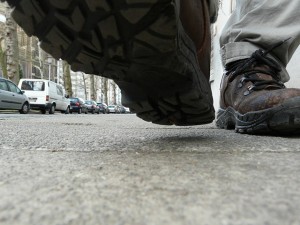Contributor: Sophia Krell, LMSW, Family Counselor for The Meadows
 Unfortunately, many alcoholics who enter treatment insist that alcohol is their only problem. If it were only that simple! In our experience, we don’t see very many alcoholics with nothing else going on. Even though some individuals are aware of the correlation between alcoholism and unresolved trauma, this isn’t necessarily the case.
Unfortunately, many alcoholics who enter treatment insist that alcohol is their only problem. If it were only that simple! In our experience, we don’t see very many alcoholics with nothing else going on. Even though some individuals are aware of the correlation between alcoholism and unresolved trauma, this isn’t necessarily the case.
What such individuals don’t understand is that trauma is an entirely different beast that also requires appropriate treatment. It’s not merely about giving up alcohol (although that’s obviously critical).
Many of our clients enter into treatment with two or more conditions requiring attention, and unresolved trauma usually sits on top of the list.
Alcoholics Need Positive Coping Skills
Many people who have learned to self-medicate with alcohol from an early age may have never had an opportunity to acquire or develop positive coping skills and strategies. Treating such individuals is especially challenging if they don’t have a robust support network.
As we’re well aware, alcoholism is a progressive disease that needs attention – it doesn’t magically disappear through wishful thinking. From the get-go, the problem kicks up when an alcoholic takes that first drink to calm his or her nervous system in what may be a sincere and innocent attempt to erase painful memories associated with trauma.
Their brain subsequently says, “Whatever you did, do more of it because you need to escape again and again.” The brain wants to flee from the memories of unresolved trauma and, unfortunately, many individuals turn to alcohol in an attempt to accomplish this feat.
We’re Not Designed to Be in a Constant State of Anxiety
 The problem is that we shouldn’t be stuck or frozen in fear and anxiety for indefinite periods of time. Such high levels of anxiety were meant for times when a big, bad grizzly bear is staring you in the face and your nervous system goes awry due to this imminent danger.
The problem is that we shouldn’t be stuck or frozen in fear and anxiety for indefinite periods of time. Such high levels of anxiety were meant for times when a big, bad grizzly bear is staring you in the face and your nervous system goes awry due to this imminent danger.
Once the bear or inherent danger is gone, we’re meant to return to a more “normal” and relaxed state.
The Loop of Anxiety and Fear
Trauma victims get stuck in this loop of high anxiety and fear. Picking up a drink often calms their nervous system and relaxes their body in the beginning stages of alcoholism. They begin to believe that alcohol is necessary for their survival, almost serving as a savior of sorts.
Anything that boosts dopamine can work in much the same way, whether it’s overeating, sex and love addiction, gambling, or any other addiction. What once seemed like a sensible way to circumvent painful memories and physical discomfort is now a source of destruction, so much so that people’s lives become unmanageable.
This behavior is no longer a source of pleasure.
Disconnecting from the Logical Self
Alcohol aids the brain in disconnecting from the logical self. We should logically realize that our life is disintegrating due to alcohol abuse. Yet people will get a handful of DUIs and race back to the local bar after being released from jail.
Logic no longer plays a role in the thought process. In the majority of cases, alcoholics (and other addicts) must hit rock bottom before they finally get it.
The Military Needs to Be Educated about Alcoholism
 It’s extremely disheartening to see many people in the military almost expected to self-medicate with alcohol. What’s ironic is that alcohol is practically perceived as an acceptable way to deal with PTSD, yet drugs – even prescription meds – are frowned upon.
It’s extremely disheartening to see many people in the military almost expected to self-medicate with alcohol. What’s ironic is that alcohol is practically perceived as an acceptable way to deal with PTSD, yet drugs – even prescription meds – are frowned upon.
Alcohol is just as dangerous! It’s tragic because such individuals are put in positions where they’re likely to be traumatized and then they’re surrounded by alcohol as a way to cope. Alcohol and trauma form a toxic partnership. A lot more education is needed within the military to address alcohol abuse.
Fortunately, help is available and we’ve witnessed thousands of individuals transform their lives. More and more research is pointing to the value of such practices as yoga and meditation – in addition to more traditional types of therapy.
There’s No Place like a Healthy Home
Of primary importance is the family system. Healthy families model healthy coping strategies that allow children to develop a healthy sense of self. There’s no substitute for positive family dynamics.
That’s why it’s so important for families to serve as positive roles model to help their children – along with other people they love – flourish and prosper.
The Meadows Wants to See You Thrive and Prosper!
Every journey begins with a single step. Through an array of time-tested modalities, The Meadows offers tools to facilitate the healing process in dealing with addiction and unresolved trauma.
We help individuals and their loved ones learn to develop healthy relationships using tools they’ll have for the rest of their lives. Our mission is to see you and your loved ones thrive and prosper! Visit us at www.themeadows.com or contact our Intake Department at 800.244.4949 to learn more.
We’re here as you embark on your journey of recovery. Take the first step to a new way of life. You’re worth it!
The opinions and views of our guest contributors are shared to provide a broad perspective of addiction. These are not necessarily the views of Addiction Hope, but an effort to offer discussion of various issues by different concerned individuals.
Last Updated & Reviewed By: Jacquelyn Ekern, MS, LPC on January 16th, 2015
Published on Addiction Hope.com
